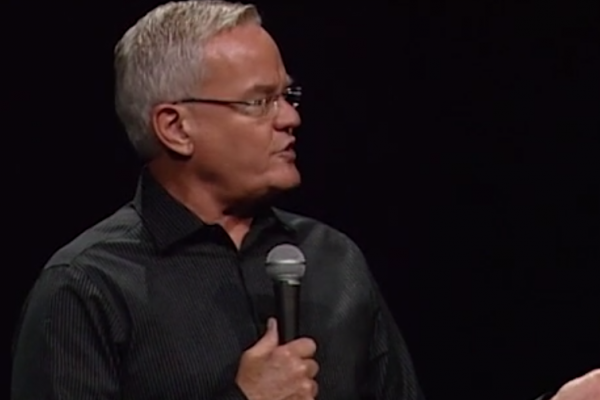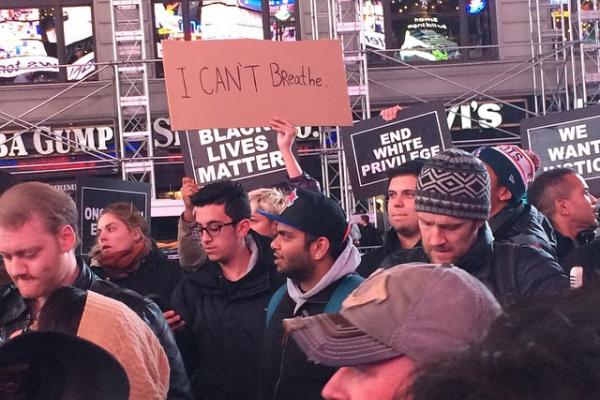This week the streets all over our country have been filled with protesters expressing grief, anger, shock and sorrow that Officer Darren Wilson (who shot and killed the unarmed 18-year-old Michael Brown) and Officer Daniel Pantaleo (who held the also-unarmed Eric Garner in a fatal chokehold during his arrest) failed to be indicted for their actions.
Last night crowds across the U.S. staged sit-ins and die-ins, clogged bridges, and shut down major highways. Many of them chanted, “No Justice, No Christmas.”
No Justice, No Christmas.
At first glance, I agreed with them. Screw it. Let’s just shut it all down. Shut down the bridges, the roads, the rivers, the train stations and the airports. Shut down the mall Santas and the Christmas pageants and the holiday parties and the family get-togethers. And then let’s shut down Christmas itself.
Because who wants to open a stocking filled with candy and socks and lip gloss when the Brown and Garner families will be grieving for their loved ones who are no longer with them? Who wants to sing about joy when our country is feeling so much pain? Who wants to proclaim, “Peace on earth, good will to men” when peace and goodwill are precisely the things we’re lacking right now?
No Justice, No Christmas. Seems like a good idea, right?
The three of us put our cups of coffee on the counter and reached into our pockets for our wallets. The check-out clerk paid no attention to any of us. He seemed to be staring at someone or something in the back of the store.
“We’re ready to pay,” one of us said.
The clerk kept looking at the back of the store. A few seconds went by before he told us what had his attention.
“I’m watching that boy over there to make sure he don’t steal nothing,” the clerk said.
The three of us looked at the back of the store and realized the clerk was talking about our co-worker.
Four of us were carpooling across Florida on a work assignment several years ago. It took several hours to cross the state. We stopped at a place called Yeehaw Junction off Route 60 to use the restroom and get some coffee.
The three of us at the check-out counter were white, like the clerk. The co-worker accompanying us was black. The clerk assumed that because the three of us were white, we would understand and agree with his attitudes and assumptions about our co-worker – that he was dishonest because of the color of his skin. Needed to be watched. Couldn’t be trusted. Too dangerous to let out of his sight.
He is the image of the invisible God, the firstborn of all creation; for in him all things in heaven and on earth were created, things visible and invisible, whether thrones or dominions or rulers or powers — all things have been created through him and for him. He himself is before all things, and in him all things hold together. He is the head of the body, the church; he is the beginning, the firstborn from the dead, so that he might come to have first place in everything. For in him all the fullness of God was pleased to dwell, and through him God was pleased to reconcile to himself all things, whether on earth or in heaven, by making peace through the blood of his cross.
—Colossians 1:15-20
As we spend this season of Advent waiting for the appearance of Christ, this passage in Colossians tells us who we are waiting for. Paul describes a ‘cosmic Christ’ who is so fantastic that our language can’t be exalted enough to praise him. In him everything will be recreated as everything was created in him. Since Jesus is the “firstborn from the dead” then there will be many born from the dead after him.
Then the angel showed me the river of the water of life, bright as crystal, flowing from the throne of God and the Lamb through the middle of the street of the city. On either side of the river is the tree of life with its twelve kinds of fruit, producing its fruit each month; and the leaves of the tree are for the healing of the nations.
-Revelation 22:1-2
Rivers and trees. The Bible begins and ends with rivers and trees: Genesis 1-2 and Revelation 21-22. Why is this striking fact not more well known among followers of Christ? What might this latter text teach us about hope in Advent 2014?
A few days ago, a friend of mine commented on a picture I posted on Facebook. It captured one of those rare moments in the daily grind of stay-at-home parenting where — in the midst of the diaper changes, meltdowns, and mealtime madness — there is a moment of pure delight. In this case, my two sons were sitting together for the first time in the front of a race car-themed shopping cart. My 3-year-old son was thrilled to have his infant brother “driving” with him. I couldn’t resist snapping a photo and posting it immediately. Having two sons of his own, my friend commented, “2 boys! What a great idea!”
I thought of this comment last Monday night when I heard the painful news of the grand jury’s decision in the Michael Brown case, and later when I heard of the same conclusion in the Eric Garner case. Yes, it was a great idea to have boys. My husband and I love them more than anything. They’ve brought more joy into our lives than we could ever have imagined. But, I wondered, how different would our experience be if we were parents of black sons instead of white sons? How much more worry and heartache would we face knowing the cards were stacked against them from birth? What would it be like to have to figure out how and when to have the talk — the one about law enforcement, no second chances and the need to go above and beyond in every situation?
I wasn’t always aware of the vastly different realities for people of color living in this country. My conversion was slow. Not the Damascus Road type of experience where I was blind for three days and then instantly I could see. No, it was and continues to be a long, slow, sometimes painful process of listening and learning.
Protests have again erupted across the United States following the Staten Island grand jury’s decision not to indict Daniel Pantaleo for the choking and killing of Eric Garner. Building off the online mobilizing network established in response to Ferguson, the most recent wave of community actions have gathered support via social media. After events are posted on Facebook or Tumblr, or simply spread through word of mouth, Twitter hashtags provide real-time updates that direct potential supporters to the location of a march.
In Washington, D.C., protests began outside the Department of Justice at 4:00 p.m. and continued throughout the city late into the night — through the National Mall, near the White House, the D.C. police department, and city hall. Comprising many races and many ages, crowds chanted phrases like, “Black lives matter” and “This is what democracy looks like.” One black mother, Shantelle, who was pushing her toddler in a stroller, explained why she was out marching today:
“We’re proud to be American. We’re military. We love our country. But we keep getting it, my son is gonna’ keep getting it. We’re not valued and we’re not looked at. I want him to grow up in a place where he doesn’t have to worry he wore the wrong hoodie, or he was playing with a toy gun, or he gets a chokehold, and dies.”
Another, older woman simply said, “I’m old. I hate that I have to be out here. I’m sick of doin’ the same old stuff.”
Bill Hybels, Senior Pastor for Willow Creek Community Church, spoke out last week on the ongoing Ferguson protests. In the video, shared this week by Willow Creek Church-affiliated artist group The Tungsten Collective, Hybels calls on people of faith to listen to the pain and hurt expressed by many since the August shooting of Michael Brown.
He quotes James 1:19, urging people of faith to “be quick to listen, slow to speak.”
Hybels has spoken out on racial reconciliation for years, and here underscores one reason why reconciliation work is often so difficult.
“It’s just so much easier to live in your own story than it is to try to understand the narrative of the other,” Hybels said.
Indeed, when it comes to interactions with law enforcement, the black experience and the white experience in America are “two totally different narratives [that often] … don’t touch each other until a Ferguson happens,” he said.
At one point the megachurch pastor emphasizes — almost uncomfortably lightheartedly — just how untouched he’s been by fear, crime, and violence in his neighborhood.
“[Peace] is all I’ve ever known. I’ve never had a single adversarial experience with a law enforcement officer in my entire life,” he said.
But in drawing a distinction in the difference of experience, he echoes a Jia Tolentino column in TIME earlier this fall on how social divisions are revealed based on which evils we mourn and pledge to fight against. While Hybels falls short of explicitly naming a power and privilege differential, he urges humility, listening, and seeking understanding among people of faith — all the more resonant today after the non-indictment ruling on the choking death of Eric Garner.
WATCH the full video here.
I was in Ferguson Wednesday when it happened: In a morally stunning decision, a Staten Island grand jury announced it would not bring criminal charges against a white police officer who choked a black man to death during a brutal incident last July. Stopped for allegedly selling some loose and therefore untaxed cigarettes, officer Daniel Pantaleo put a “chokehold” on Eric Garner, despite the fact that the move is against NYPD rules. Video of the incident shows Garner uttering his last words, “I can’t breathe.” New York’s medical examiner officially called this a “homicide,” but the grand jury said no charges will be made.
Of course, this comes just 10 days after the Ferguson grand jury decision not to indict another white police officer, Darren Wilson, for fatally shooting an unarmed black teenager named Michael Brown on Aug. 9. Sojourners had convened a retreat in Ferguson for both national faith leaders and local pastors to look deeply at the historical and theological foundations of the Ferguson events and reflect upon how the church must respond. Emotional calls from pastors in New York City came with the horrible news, and people just began to weep — one young man wailing, “This time it was all on video …. and it still didn’t matter! How can I as a black man bring a black son into this world?” Lament and prayers followed with a resolve from an extraordinary two days on the ground in Ferguson — to act.
Local experts in St. Louis County helped us understand the damage done to their local communities for decades that led to the response that erupted after the killing of Michael Brown. We walked silently and prayerfully alongside the memorial to the slain teenager on West Canfield Avenue with black parents imagining their own sons lying there, and white parents realizing this would never happen to our kids. We kept looking at the street where this bloody incident had taken place, feeling more and more doubt about the narratives the county prosecutor had used to exonerate and excuse the white police officer from any responsibility — or at least a trial to publically sort out “conflicting testimonies.”
We met in a church with seven young leaders of the Ferguson protest movement. In just 116 days, these young people had become self-educated and extraordinary leaders, and we listened to a compelling analysis of their urgent situation and how they were trying to apply the history of social movements to change their oppressive circumstances. Their chilling stories of police harassment and brutality, preceded by a narrative of the educational and economic brutality that black young people like them experience daily were transforming words for those of us who listened, spellbound. As I listened, I realized America would be converted by these young people’s honest and earnest conversation — they would win the national debate about our criminal justice system’s response to young people of color.
There’s this microaggression happening online, offline, and all around that has a nice sentiment, but really needs to stop. Can we call for a week-long moratorium on decrying “ALL LIVES MATTER?”
This is a request specifically for my white brothers and sisters, especially those in the church.
I, of course, as a white heterosexual married middle-class highly educated American male, believe that all lives matter. It’s something I’ve been fighting for my entire adult life. Whether it is the mother infected with HIV by her wayward husband in western Africa, whether it is the undocumented immigrant father who may be separated from his American-born children, whether it is the NRA card-carrying white uncle who does an honest job and is a good neighbor back in the midwest, whether it is the homeless thirty-something woman coming off a bad meth addiction but needing shelter during a difficult winter, of course, by all means, every life matters.
Your life matters. My life matters. All lives matter.
This is a non-negotiable. This is true. This is what it means to be made in the image of God, as we’re told in the Book of Genesis — everyone, whether you’re white, black, brown, male, female, straight, gay, bisexual, transgender, Republican, Democrat, rich, poor, nice, kind of a jerk, young, old, middle-aged, we all matter.
But these past couple weeks — these past four months, five months, 22 months? — it’s important that we stand with the ever-growing chorus and declare, yes, black lives matter. With the heartbreaking, soul-wrenching death of Michael Brown, the news just yesterday of another non-indictment in the death Eric Garner, or the dark night when Trayvon Martin was shot down in Florida, a chorus of voices has risen to declare with one voice and hashtag that #BLACKLIVESMATTER.
After the monsoon, after work, I catch
you with your face in the hot laundry,
the syntax of spring held together by sap,
hanging wild and worried and crazy
in the lowest branch. In the ripe country,
salmon fold over the linens of the bay,
and I weep with you from the shore, embodied.
For still you feel the fell of dark, not day.








